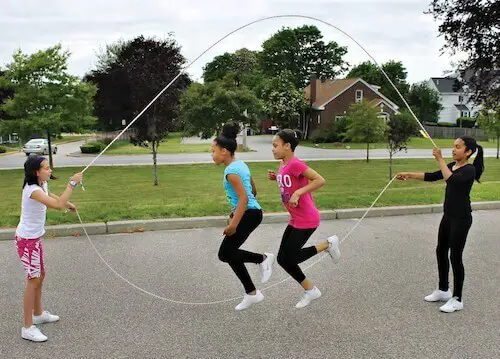Nonsense; gibberish – a language one cannot understand.
Double Dutch
What's the meaning of the phrase 'Double Dutch'?
What's the origin of the phrase 'Double Dutch'?
There are a host of phrases in English that include the word ‘Dutch’; that’s hardly surprising as The Netherlands is just a few miles across the sea from England. We don’t have anything like as many expressions that include ‘French’, so why the interest in ‘Dutch’? Two reasons: trade and war.
Both England and Holland (which is what most people call The Netherlands), have a vigorous and wide-ranging maritime trading tradition that dates back to the 16th century. England imported many commodities from Holland and gave them ‘Dutch’ names. The first of these imports was ‘Dutch sauce’, which we now call Hollandaise. Claudius Hollyband referred to this in the French Schoole Maister, 1573:
Will you eate of a Pike with a high dutche sauce?
Many other examples followed:
Dutch cheese – first used in 1700.
Dutch barn – 1742.
Dutch hoe – 1742.
Dutch oven – 1769.
The Anglo-Dutch wars of the 17th and 18th centuries were acrimonious even by the usual standards of war. Following the conflicts the English came to hold the Dutch in very low regard and as a consequence there are numerous English phrases which portray them in an unflattering light, often as skinflints or drunkards. The common strand in all of these disparaging ‘Dutch’ expressions is that anything Dutch is the opposite of what it ought to be. Examples of these expressions are:
Dutch bargain – a bargain made when one is debilitated by drink – first recorded in 1654.
Dutch defence – a legal defence in which the defendant seeks clemency by deceitfully betraying others – 1749.
Dutch comfort – cold comfort; only good because things could have been worse – 1796.
Dutch metal/Dutch gold – a cheap alloy resembling gold – 1825.
Dutch courage – brash bravery induced by drink – 1826.
Dutch treat – no treat as such; each person pays for their own expenses – 1887.
Added to that list is ‘double Dutch’. The Anglo-Dutch wars were a very long time ago and we are all friends now, but at this point we can introduce another reason for the English to have held on so long to hostile stereotyping of the Dutch, that is, the link with the UK’s 20th century military rivals, the Germans. ‘Dutch’ was originally the generic name for both Germans and, as they were formally called, Hollanders. High Dutch was the language of southern Germany and Low Dutch the language of The Netherlands.
Double Dutch is in fact a synonym for High Dutch and as such is a slur on the Germans rather than the Dutch, although the distinction may not have been apparent to the average 18th century English sailor. Charles Dibdin was the first to allude to the incomprehensibility of the language, in Collected Songs, 1790:
Why, I heard our good chaplain palaver one day,
About souls, heaven, mercy and such;
And, my timbers! what lingo he’d coil and belay,-
Why, ’twas just all as one as High Dutch.
The earliest example of ‘double Dutch’ that I have found is in John Davis’ Travels of Four Years and a Half in the United States of America, 1803, in which the author spoke to a colleague in Welsh:
“Mr Adams – What devil language is that? Is it double Dutch coiled against the sun?”
The coiling that was referred to in both the above citations was the winding of rope. Sailors called anti-clockwise winding ‘coiling against the sun’. This was generally disparaged and an indication that ‘double Dutch’ was the linguistic equivalent of a badly coiled rope. Most of the early citations of ‘double Dutch’ are in their full form ‘double Dutch coiled against the sun’. We can safely assume that what was meant by ‘double Dutch’ was ‘Dutch that is malformed and twisted’ rather than ‘Dutch, twice over’.
In recent years the computing term ‘reverse Polish’ has come to be synonymous with incomprehensibility. In fact ‘reverse Polish’ is a structured notation of formulae to enable machine calculations and is not open to interpretation or ambiguity. Nevertheless, many people find it confusing.
Double-Dutch is also the name of a children’s skipping game, in which two ropes are used. This is referred to in Alice Gomme’s The Traditional Games of England, Scotland, and Ireland, 1894. The game is still played, both on the street and at tournament level, most commonly in the USA, where skipping has the more descriptive name of ‘jumping-rope’.
The history of “Double Dutch” in printed materials
Trend of double dutch in printed material over time
Related phrases and meanings
Browse more Phrases
About the Author

Phrases & Meanings
A-Z
A B C D E F G H I J K L M N O P Q R S T UV W XYZ
Categories
American Animals Australian Bible Body Colour Conflict Death Devil Dogs Emotions Euphemism Family Fashion Food French Horses ‘Jack’ Luck Money Military Music Names Nature Nautical Numbers Politics Religion Shakespeare Stupidity Entertainment Weather Women Work
How did we do?
Have you spotted something that needs updated on this page? We review all feedback we receive to ensure that we provide the most accurate and up to date information on phrases.
